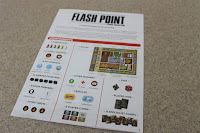TGN scale:
Story - 3
 There is a fun premise and story here. It's interesting, but it isn't very complex. You can get the entire story from the box,and it isn't particularly far out there. It may not be a traditionally nerdy premise, but on the other hand, I think everyone has imagined themselves a firefighter at one time or another, right?
There is a fun premise and story here. It's interesting, but it isn't very complex. You can get the entire story from the box,and it isn't particularly far out there. It may not be a traditionally nerdy premise, but on the other hand, I think everyone has imagined themselves a firefighter at one time or another, right? Immersive - 7
Immersive - 7This game does a pretty good job making you feel like you are actually trying to keep back a fire. The advanced game draws you into the story even more because of all the different characters, the explosions, and the hot-spots and everything. The fire feels alive (minus the heat), and it very hard to defeat.

Learning Curve - 5
The basic game isn't all that complex, but it does have some specifics that can be difficult to remember. The instructions are 12 pages long, and the game includes a card for each player that reminds them of which actions can be performed (a tell-tale sign of a nerdy game). Also, the strategy is not always easy, though it is similar to other co-op games. The advanced game is higher learning curve than the basic game, but 5 is probably the average between the two.
 Time - 5
Time - 5I have found the predicted 45 minutes to an hour to be pretty accurate once you get the hang of it. Not an overly quick game, but not as long as most other more nerdy games either.
Final TGN score: 5
On a scale from Chutes & Ladders to Dungeons & Dragons, Flash Point Fire Rescue falls somewhere in the middle as far as nerdiness. So it's around the same level (maybe slightly lower) as Forbidden Island, or Dominion, about what you would expect based on the art on the box, actually.
 My biggest complaint with this game is probably the same thing that makes it interesting. I felt like the game creator Kevin Lanzing couldn't decide whether to make this a family game or a game for gamers, so he just made it both. I can't really complain about it though. How can I complain about two games in one? I can play the basic game with my family, the advanced game with my friends, and be happy both times. Besides that, I found the game interesting, intense, playful, and flexible. Co-op games rule!
My biggest complaint with this game is probably the same thing that makes it interesting. I felt like the game creator Kevin Lanzing couldn't decide whether to make this a family game or a game for gamers, so he just made it both. I can't really complain about it though. How can I complain about two games in one? I can play the basic game with my family, the advanced game with my friends, and be happy both times. Besides that, I found the game interesting, intense, playful, and flexible. Co-op games rule!As always, I am not at all affiliated with this game or its makers, and am reviewing this game just because I'm a nerd, I've got time, and I want to, and for no other reason.















